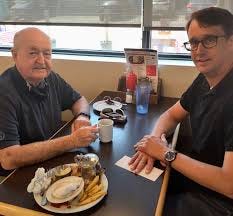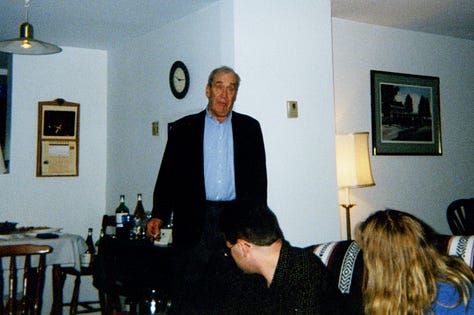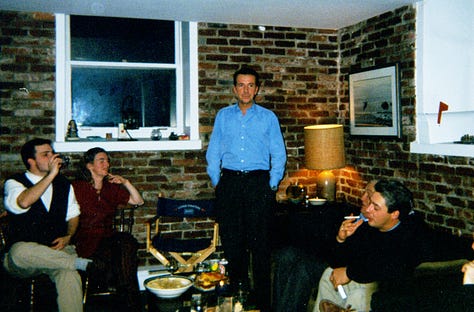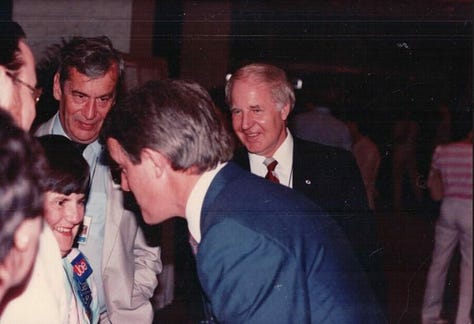'The Country is Greater than Any One Party'
Assorted wisdom from two of my political mentors
The Toronto Maple Leafs won the battle of Ontario this week! That was the highlight of the week for me. I want to congratulate the Leafs on this first victory of the playoffs. I would also like to congratulate Prime Minister Mark Carney, who won the other battle of Ontario (and Canada) this week. In a stunning come from behind win, the Liberals formed another minority government. While I know PM Carney is an Edmonton Oilers fan, I am only assuming that he was quietly cheering for Toronto as well from his time living and working in the city. After all, everyone has their ‘back-up team’ that they also root for in the playoffs. [Full Disclosure: mine is the Winnipeg Jets]
The other blue team I cheer for lost this week and it was a very tough loss. I know what losing a general election feels like when you think it was possible to win. While we entered the 2021 election behind and with the challenges of the pandemic, we pulled ahead and were winning for a large portion of the campaign. Falling short is devastating, which is why I have largely said nothing during and after the campaign. I know that everyone worked very hard.
The most difficult part of election night was seeing some good friends lose their seats. This was particularly the case for several MPs who won for the first time in 2021 when I was the Conservative leader. Their voices will be missed in their ridings and in Ottawa. I know how they are feeling at the moment. It takes some time for the sting of defeat to fade, but fade it will. The Liberals and the NDP also lost some MPs on election night. Regardless of party, all of these Canadians should be proud for having stepped up to serve their country in parliament.
I also think that the captain of the blue team has earned the right to stay on the ice as leader. Pierre Poilievre made gains in seat count and in securing support from groups of Canadians that had not previously voted Conservative. He has the support of the caucus and grassroots. I also know that Pierre and his family worked hard and made the incredible sacrifices that come with public service. As leader, however, he has responsibility for the loss and a responsibility to ensure that our team learns the lessons of the election.
Lessons from the 2014 Ontario Election
I was fortunate to have several important political mentors in my life and I have been thinking a lot about some of the advice they gave me as I have been speaking with people about the Conservative loss. I am out of politics now and generally try and stay out of the way for the new leader, so I am not going to critique the campaign in terms of what went right and what went wrong. This essay is intended to share a few lessons for Conservatives and for all politicians in these challenging times of political disruption and polarization.
My most important mentor was, of course, my father John O’Toole. My Dad was elected to the Ontario Legislature in 1995 and served until 2014 when he made the decision to leave public life. When he was first elected as the Member of Provincial Parliament (MPP) for Durham East in 1995, I was already out of the house and serving in the military, but I helped on his campaigns. I formulated my approach to politics and servant leadership from watching him. His long years of service also meant that we overlapped for just over a year as MPP and MP. According to political sage Steve Paikin, we were the first father and son to serve at two levels of elected office at the same time in Canadian political history. Our appearance together on Steve’s program The Agenda still ranks as my favourite interview.
The first lesson I want to share comes from his decision not to run in the 2014 Ontario election. It was a curious decision to many people at the time, as the Ontario PC Party was leading in the polls and his reelection was a virtual certainty. The Ontario Liberals had become quite unpopular and that pressure led their multiple term leader - Premier Dalton McGuinty - to resign mid-mandate in an effort to give the party a chance in the next election. Kathleen Wynne won the leadership of the Ontario Liberals and stepped into the role as Premier and leader of a governing party that was consistently behind in the polls. Does this sound familiar?
Wynne had been Premier for just a year when my father announced his intention not to run in the next election at the end of Feburary 2014. The election was gearing up to be an election on the economy and job creation, as Ontario had struggled through manufacturing job losses and a stubbornly high unemployment rate. The issue set looked perfect for a change election in favour of the PC Party. John O’Toole was leaving his riding with a great organization, money in the bank for the next campaign and time for a competitive nomination race to pick a good PC candidate. A victory for the blue team looked all but assured when he left, but they would lose the election and the Durham seat months later.
My father made the decision not to run because he felt his party was losing touch with the priorities of the families he represented in Durham. In particular, he had a public disagreement with his party leader on the subject of ‘right to work’ legislation. As someone who had spent thirty years working at General Motors in Oshawa before he ran for office, my father knew the important role unions played in balancing the economy for both white and blue collar workers. While union leaders would denounce the PC Party in each election, most of the actual members on the ground in Durham voted PC. My Dad thought it would be very hard for him to sell the right to work message in his riding, so he fought hard against the policy internally before deciding that he was not going to run again.
The Ontario PCs were ahead in the polls in 2013 and into the 2014 election year and this might explain, in part, why the right to work policy was considered. In the US, several Republican states had been implementing ‘right to work’ laws to suppress the power of unions, and there was a sense by many that taking the same approach in Ontario might lead to private sector hiring. On top of this, the leader, MPPs and PC organizers remembered the unfair attacks levied against them in the 2011 Ontario election by the union-funded Working Families Coalition. It is hard to escape the fact that an element of political payback was part of the rush to embrace right to work laws. The problem my father had with this strategy is that he viewed it as unfair to his constituents. He also believed that the policy would backfire in the election and had even been caught on tape at a convention warning that the PCs would be “screwed” if this was an election issue.
While the Ontario PCs ended up dropping the idea of having a right to work policy just ahead of the 2014 campaign, my father had already made the decision to move on. So too, it seems did a number of accessible PC voters. The public defence of right to work and spats with union leaders at a time when job security was the top concern for many Ontarians ended up striking the wrong tone for the Ontario PC Party and polls narrowed in the lead up to the election. When the 2014 election came and all parties were running on variations of platforms related to “Jobs”, the PC pledge to cut 100,000 Ontario civil service jobs turned the wariness some voters had towards the Tories into firm opposition. Premier Wynne defied the predictions from months earlier and was elected to a majority mandate in the 2014 election. Her win and our loss in Durham was largely based on the fear that many households had in relation to the 100,000 job cuts.
There are many lessons to be taken from the parallels between the 2025 Canadian election and the 2014 Ontario election. The first is the fact that polling in advance of an election means very little if you are not talking about the issues keep families up at night. In 2014 it was job losses and economic uncertainty, in 2025 it was President Trump and the tariff war. The 2014 campaign is also a reminder that political policies that work well for US Republicans may often lead to a very different result in Canada.
To end this lesson on a high note, one conservative politician learned the lessons of 2014 so well that it has helped propel the Ontario PC Party to three consecutive wins under Premier Ford. Monte McNaughton went from being the PC Labour Critic who led the right to work push in 2014 to becoming the first major conservative political figure in Canada to develop a dialogue of trust and success with private sector unions just a few years later. Monte helped turn political foes into friends by working with workers and their representatives rather than fighting with them. I based a lot of my federal Conservative outreach to union leaders and their members on Monte’s trailblazing work. Pierre continued this federal strategy and it led to one of the great breakthroughs on election night and helped elected several new MPs in ridings across southern Ontario.

David MacKeen and the Stanfield Standard
My father was my first political mentor and someone who inspired me to run for office, but the next most important political mentor in my life was not a relative at all. It was a person I met shortly after moving to Halifax. This mentor taught me about political loyalty, showing respect for difference and always putting the country first.
I met Henry David MacKeen when I was serving with the air force in Nova Scotia and volunteered time with the Nova Scotia PC Party. David was forty years older than me and had served as the Deputy Mayor of Halifax the year I was born. There was no reason for us to become friends, but we did. I was fascinated by David’s personal story as the scion of a Tory political dynasty in Nova Scotia. Both his grandfather and his father had served as Lieutenant Governor (LG) of the province after exceptional careers. His grandfather - David - had been a business leader in Cape Breton and later the Tory MP and Senator before being appointed LG by Prime Minister Borden. His father - Henry - was a lawyer and militia officer who had been named LG by Prime Minister Diefenbaker. His portrait hung in the law firm I would summer with years later as a law student given he had been a founding partner of the law firm that is now the largest in Atlantic Canada.
David had absolutely nothing in common with this young guy from Ontario, but took a shine to me because he loved meeting new people in politics and because I had graduated from the Royal Military College of Canada. His father had been the commanding officer of the Halifax Rifles during the Second World War and had always spoken highly of the RMC. I think he might have even suggested David attend the RMC for the discipline he might find there, so that might be the reason that David took this young ‘Upper Canadian’ under his wing. He introduced me to people and brought me to events that I had no reason to be at other than I was David’s guest. Depending upon the time of day, he would buy the coffee or something stronger just so he could hold court and regale a small group of us with political war stories. I can still hear his deep baritone voice saying “Jeeee-sus…” between puffs of his cigarette as he transitioned from one politcal yarn to another.
Most importantly for me, David helped me step out of my twenty-something comfort zone. I learned a lot about Nova Scotia, about the PC Party and about forging new friendships that I likely never would have made but for him. One vivid memory is the time that David drove me to the park by the ‘new bridge’ in Halifax where the historic Africville community once stood because I had told him that I had not heard about this community as a kid from Ontario. He took me to see the site and told me of the trauma related to its destruction. He introduced me to his friends in the black community in Nova Scotia and told me about the hardships and discrimination faced by a community that had roots that were just as deep, long and loyal to Canada as those of United Empire Loyalists in Ontario.
David even brought me into a campaign to help his friend Linda Carvery when he convinced her to run for the Nova Scotia PCs in his beloved north end seat of Halifax Needham. This was a big coup for the PCs, as Linda was a prominent member of the black community from her acclaimed career as a singer with the Nova Scotia Mass Choir. She was a high profile candidate running in a challenging urban seat for the PCs. I know she agreed to run, in part, because she trusted David to help her build a team. It always amazed me how this son of south end Halifax privilege was actually more at home hanging out in the north end with people who shared his passions.



The greatest lesson I learned from David was about loyalty. This was a lesson I learned early into my friendship with him, as he pulled me into a volunteer campaign to help support the Nova Scotia PC Leader. John Hamm was facing a small grassroots effort to replace him as leader after a disappointing election that had relgated the Tories to third place in 1998. This result had little to do with Hamm, and more to do with the fact that the PCs needed to slowly win back voters who had rejected them just a few years earlier after five consecutive PC governments stretching back to 1978. The party was still in rebuilding mode and David was convinced that the good natured doctor from Pictou country was exactly the person needed to win back the trust of Nova Scotians.
David told me that John Hamm reminded him of Robert Stanfield, the former PC Premier of Nova Scotia and PC Leader federally. David had worked for Stanfield as a volunteer and as a staffer, and he idolized his work ethic and how he treated people. It was during his effort to defend John Hamm that I first heard a line from David that he attributed to Stanfield, or at least to his time being around Robert Stanfield. It was a quote that I would hear him recite many more times throughout our friendship. It became a big part of my personal political philosophy.
The party is greater than any one man and the country is greater than any one party. - David MacKeen
David told me he was helping John Hamm because he was the leader of his party and that fact alone deserved his loyalty. He felt that people needed to put their personal ambition or petty jealousies aside and do what was best for the country and party in that order. David told me it was Stanfield that had instilled these values in him and set the example he wanted to follow in politics. Be loyal to your country. Be loyal to your party. Be loyal to your friends and never give up on anyone. These were elements of what I could best describe as David’s ‘Stanfield standard’ for political involvement.
He also told me a story that embodied Stanfield’s desire to always put the country first in one of his sessions holding court in Halifax. Just months after being elected to the House of Commons in a by-election as the new PC Leader, Robert Stanfield had an opportunity to force a snap election that he might win, but he chose not to because it would have been ‘bad for the country’. This Stanfield side of the story has been reported in a few places by those who worked with him at the time even though the better known version of the Pearson government losing a vote in the House of Commons by an 84-82 margin often don’t include the behind the scenes accounts. To summarize the issue, the Pearson government had lost a vote on an important tax meausre by accident when Prime Minister Pearson was on holiday and his party was left flat-footed for the vote. By constitutional convention, losing a vote on a tax measure like this could have plunged the country into an election, but the Opposition Leader chose to not force the issue. He decided to have his caucus return to debate in advance of another vote that the government won as a clear expression of confidence.
The behind the scene story reveals that Stanfield decided not to force the election after having received emergency briefings from the Governor of the Bank of Canada and other government officials. They warned of dire impact on the economy if the vote was to stand. Leading in the polls and facing a weary and soon to retire Lester Pearson, Stanfield trusted the opinion of the Bank Governor and officials and helped engineer a second vote out of concern for the economy.
“The party is greater than any one man and the country is greater than any one party.” The outcome ended up being a harsh one for Stanfield as he watched the Pearson government win the second vote only to have Pearson retire months later. He was soon replaced by a younger, charasmatic Liberal leader in Pierre Trudeau. ‘Trudeau-mania’ in 1968 would lead to the first of three election losses (two very narrowly) by the PC Party under Robert Stanfield. The man who always put the country first paid for it by coming second three times.
There are a couple of lessons my Conservative friends and all politicians can learn from Robert Stanfield. First, is that ‘country first’ must be the motto of all Canadian politicians in the next few months as the country faces off with the Trump administration. We have witnessed the transformation of our closest friend and ally into a hostile and dismissive neighbour and the country is rallying together as a result. Whenever there is an opportunity for unity between the political parties in Ottawa in the face of hostile or unfair actions by the American adminstration, Canadians will expect that the parties come together. There is no time for unnecessary partisanship when our country is at serious risk.
A final lesson that can also be learned by my Conservative friends is the fact that Canadian conservative parties only win when they work together federally and provincially with the view to standing up for Canadians in all parts of the country. Some of the internecine conflict after the election is not helpful. I got my start with the Ontario PC Party and the Nova Scotia PC Party before I went on to become an MP, Minister and Leader of the federal Conservatives. Our volunteers, voters and donors are often the same. It is time for everyone to remember that. As my friend and former MP from Saskatchewan Robert Kitchen once reminded me: “In unity, there is victory”. That is indeed the case for Canada and for the Conservative Party of Canada if they channel the wisdom of Stanfield and his friend David MacKeen.







Mr. O’Toole, you are being too kind. The current CPC leadership team does not share your sense of decency and honour. We all know the reaction of Jenny Byrne to your courteous message to Liberal Anita Anand.
You also know that PM Carney will govern from the centre, and his economic policies are quite acceptable to progressive conservatives.
So, it is time to put country over party. I encourage you to join the Carney government in anyway you can, to help with the multiple challenges we face over the next 5-10 years.
Use your considerable influence among the progressive wing of the conservative party, because I am not too confident that the current CPC leadership will be willing or able to do it.
Loyalty and its twin humility are the unsung heroes of a society that glorifies rugged individualism ahead of determined collaboration and debate. Loyalty and humility in action are pillars of liberty and democracy. Great message Erin.